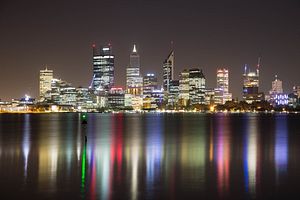Australia has coasted on the back of the mining boom for years, selling iron ore and other resources to a fast-growing China. The agreed wisdom was this was no brief bubble, but a decades-long boom of demand from a billion-strong nation. It was not.
Western Australia was largely the driver, with the bulk of the minerals coming out of its vast deserts. In 2014 the state had the strongest economy in the country. This year it has slipped to seventh, ahead only of long-struggling Tasmania. However the eastern states continue to prosper, with more established economies and a greater breadth of industry.
According to a June report from St. George Bank, “The [Western Australia] economy is now larger but growing at a very modest pace. Growth is based on exports rather than domestic demand.” Next year is forecast to be modest, too.
Many of the major stats are bad, from high unemployment to dropping housing prices in the state’s capital, Perth (in most of Australia they continue to rise). According to Seek, one of the country’s largest employment websites, job advertisements were down close to 15 percent from May 2015 compared with May this year. Consumer confidence is down too, as is discretionary spending. Is the state on a doomed course?
Possibly not.
Some see this as a correction, or even an overcorrection, but not a death knell. Partly this is because the boom times drove prices up to highs that were unsustainable. There were areas of Perth where coffees were fetching A$7 or more (though some places still charge A$4-4.50, far higher than the eastern states) and many locals were forced out of the property market by skyrocketing rents and the out-of-towners able to pay them. The situation has since stabilized and the renters’ market is now a good one (real estate agents will actually call you back, a pleasant change from last year) whilst lower city rents have also lured back businesses that were pushed to the suburbs a few years ago. It’s bad news for the property market’s number crunchers, but may give all a moment to catch their collective breath and reassess. Remember, high rents have caused serious issues in New Zealand.
Is the boom a whimper now? ANZ Bank wrote in May, “Encouragingly, bulk commodity prices appear to have broadly found a base. The price of iron ore – the state’s most important commodity – has risen this year amid signs that proactive steps by China’s authorities to support China’s housing sector and broader activity are working.”
Thus the state will likely continue to depend upon exports but there are broader hopes to diversify the market, possibly by looking at the rest of Asia and India and capitalizing on that most Australian dream, the middle class. Certainly with three newish FTAs with major Asian economies–China, Japan and Korea—that’s been the hope and a weaker Australian dollar may provide that.
Agribusiness is a growing sector but Western Australia currently lacks the infrastructure to be a genuine food basket for Asia, even as demand grows, especially for high quality produce. More boutique areas like wine are increasingly doing well, especially in China, but the state’s main wine producing region, Margaret River, lacks the brand recognition of some of the better known regions in the east. Services from further up the food chain, so to speak, such as processing and food safety might be a growth area.
The state’s other problem might be political; the state government is going through a period of instability and unpopularity, with its premier, Colin Barnett, winning a leadership spill instigated thanks to his “erratic and illogical” leadership, according to MP Dean Nadler. Then again, Australia has suffered brutal political instability since 2007 (which we’ve covered extensively) and continued on through its quarter century of growth.
Meanwhile St. George’s Bank sees light at the end of the tunnel, even if it still a while off: “The outlook is difficult but not dour. Another tough year ahead is expected but the economy should expand courtesy of the export sector.”

































